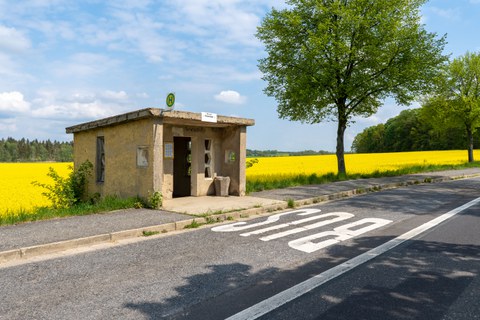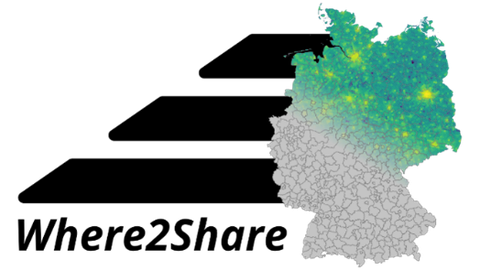Jul 14, 2023
Mobility of tomorrow? Project "Where2Share" investigates the benefits of ride sharing in German cities and counties

Bus stop in a rural area. New forms of mobility could offer an opportunity to make services more flexible in various regions and improve them so that more people can use public transport easily.
Where is shared mobility particularly useful and how can we ensure it is sustainable? A new research project has been running at the Chair of Network Dynamics at TU Dresden since July 1, 2023. Ridepooling models developed at the chair are now to be applied nationwide. The researchers are developing a "potential map" of different regions in order to obtain an overview of the applicability of this new type of transport service. The "Where2Share" project is funded by the German Federal Ministry for Digital and Transport as part of the mFUND innovation initiative over the period July 2023 to December 2024 with a total of almost 193,000 euros.
Ridepooling offers new ways to reshape mobility to be more demand-oriented, flexible and sustainable. This can improve access to public mobility for everyone - especially in regions where continuous scheduled transport is financially difficult to implement. In ridepooling, a vehicle transports several passengers from door to door at the same time by combining two or more trip requests with similar origins and destinations. Well-known providers of such models include MOIA and Uber. However, the potential of these services varies from application to application. Whether and in what form a ridepooling service will be sustainable and efficient can currently only be determined through expensive pilot projects or elaborate simulations with high data requirements.
In the Where2Share project, fundamental theoretical findings on the dynamics of complex ridepooling systems will be further developed and applied throughout Germany. Despite large differences between cities and rural regions, ridepooling vehicle fleets always behave similarly. Thus, the models can provide estimates for the potential efficiency and sustainability of such services already with only little widely available data, such as the structure of the road network and population distribution. The goal of the project is to use these predictions to create a spatially resolved assessment for the potential of ridepooling services and make it accessible as an interactive map of Germany to support regional planning of such transportation services. This could then help regional transport companies, transport associations or private mobility providers to make decisions about the type and implementation of these contemporary, new forms of transport.
The output of the 18-month project will be a data pipeline for automated prediction of performance metrics for ridepooling services such as mean travel time and distance traveled. The theoretical models will be tested and refined through simulation and data-driven comparisons. Furthermore, the project will investigate how additional aspects of ecological (e.g. number of vehicles), economic (e.g. costs for operators and users) and social sustainability (e.g. efficiency differences urban-rural) can be integrated into these models and which data is necessary for these extensions. Such novel mobility systems could provide an opportunity to restore everyday public transport accessibility to those population groups that are currently often not served according to their needs, such as the elderly or young people in rural areas.
The Where2Share project is conducted at the Chair of Network Dynamics at the TU Dresden. Dr. Malte Schröder, head of the team 'Collective Dynamics of Sustainable Mobility', will coordinate it as a project leader.
Note: On July 19, from 14:00 - 15:30, a kick-off event will be held to introduce the project. The event will be held online and participation is open to all interested individuals (the event will be in German). Registration is possible by sending an email to .
Project duration: 07/2023 – 12/2024
funding amount: 192,631 €
project webpage: https://bmdv.bund.de/SharedDocs/DE/Artikel/DG/mfund-projekte/where2share.html
Media inquiries:
TU Dresden, Center for Advancing Electronics Dresden:
Dr. Malte Schröder, Chair of Network Dynamics
Tel.: +49 351 463-43976
Matthias Hahndorf
Science communication
Tel.: +49 351 463-42847
About mFUND of the BMDV:
As part of the mFUND innovation initiative, the BMDV has been funding data-based research and development projects for future-oriented digital and networked mobility solutions since 2016. Project funding is supplemented by an active professional networking between stakeholders from politics, business, administration and research and by making open data available on the Mobilithek.
For more information, visit www.mFUND.de.
About the Chair of Network Dynamics
The Chair of Network Dynamics headed by Prof. Marc Timme was established in 2017. The goal of this strategic professorship at TU Dresden, which is affiliated with both the research cluster "Center for Advancing Electronics Dresden" (cfaed) and the Institute for Theoretical Physics, is to bridge methods from applied mathematics and theoretical physics to applications in biology and engineering. It is the first professorship for network dynamics in this cross-disciplinary character in Central Europe. Since networks are almost everywhere around us, the research team aims to unify understanding of the fundamental mechanisms underlying the collective dynamics of large, nonlinear, interconnected systems by combining fundamental theoretical descriptions with data-driven analysis and modeling. An essential part of their work in investigating self-organized systemic effects and developing new conceptual perspectives for theoretical as well as computational tools necessary to understand these dynamics. This understanding is the basis for predicting and ultimately controlling the behavior of complex networked systems.
Further information: http://networkdynamics.info
About cfaed - Center for Advancing Electronics Dresden
The cfaed is a research cluster at TUD Dresden University of Technology. As an interdisciplinary research center for perspectives in electronics, it is located at the TUD as a central scientific institution and integrates members from non-university research institutions in Saxony and Saxony-Anhalt as well as the TU Chemnitz. The cluster is dedicated to the fundamentals of future-proof information technologies that would not be possible with today's silicon-based devices. To achieve its goals, the cfaed combines the thirst for knowledge of the natural sciences with the innovative power of the engineering sciences. www.cfaed.tu-dresden.de


